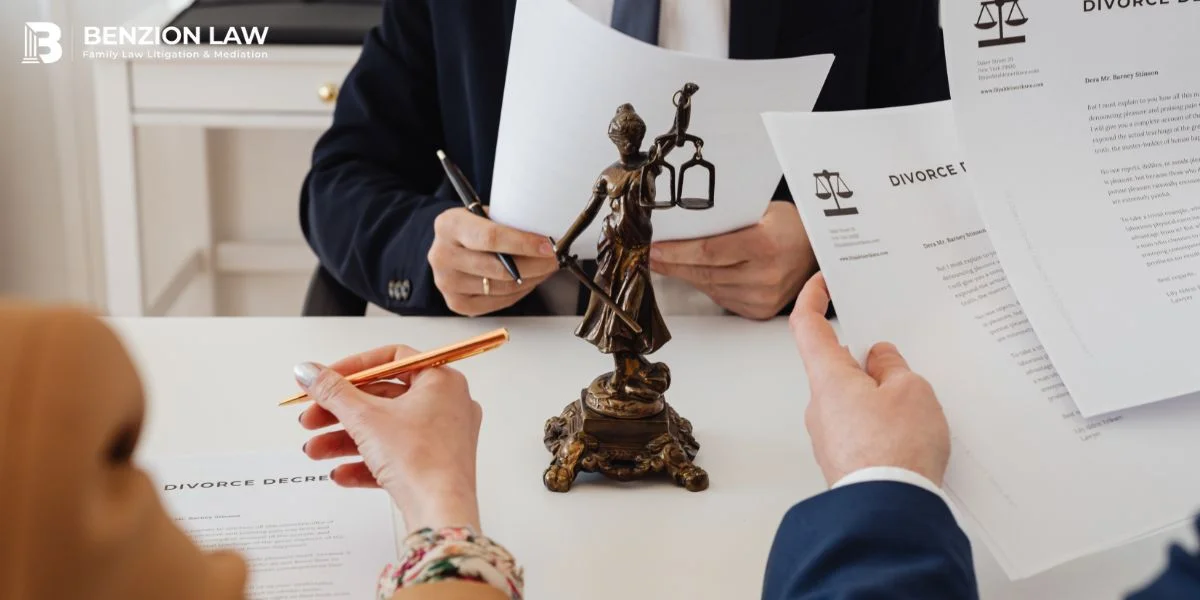Boca Raton High Net Worth Divorce Lawyer
Boca Raton High Net Worth Divorce Attorney
Going through a divorce can be challenging, even if the decision to divorce was an easy and amicable one. It affects everyone involved and can be an extensive process, depending on the circumstances. When there are many assets to split, such as in a high net worth divorce, this can complicate the process even more. If you are going through this type of divorce, a Boca Raton high net worth divorce lawyer can help.

Why Choose Us?
At Benzion Law, we understand the complexities surrounding divorce law in Florida. We know that dividing assets of all different types can be difficult to navigate. As a law firm with years of success and dedication to family law, we are committed to providing you with the support you need. We can work to understand your specific case and provide you with the tailor-made legal counsel that you need. Our attorneys can advocate for your rights and fight for the outcome you deserve.
What Is a High Asset Divorce?
In a high asset divorce, there are usually significant financial assets involved. Examples of these assets include:
- Multiple properties
- Investments
- Substantial savings accounts
- Multiple businesses
- Real estate
- Vehicles
- Boats and yachts
- Jewelry
- Stocks, bonds, and mutual funds
- Retirement accounts
- Ongoing income
- Debts, such as mortgages, loans, and credit card debt
High-asset divorces in Boca Raton differ from regular divorces because they often require complex and intense financial negotiations. Assets and debts will need to be identified and valued in order to determine how they will be distributed to the parties. This can lead to disputes over the division of these assets.
How Assets Are Divided in a High Net Worth Divorce
Before assets and liabilities are divided, the courts will determine and consider a number of things which are required before an equitable distribution can take place.
First, all assets that spouses own and debts they owe must be identified. Afterward, the court will determine which assets and debts are marital and which are non-marital. Then, the assets will need to be valued and the balance of debts determined. In Florida, non-marital assets are typically those that were acquired outside the marriage. This can include property purchased by one spouse before the couple got married. This also includes any income that may have been acquired as a result of that property or any other asset acquired before the marriage.
Non-marital assets also include gifts that were given to one of the spouses by another person who was not their spouse. If the couple signed an agreement, such as a prenuptial agreement, specifically excluding certain assets from division upon divorce, those assets are considered non-marital as well.
Marital assets are acquired during the marriage, either individually or jointly. Gifts between the two spouses are also considered marital property. Marital assets also include benefits acquired during the marriage, such as retirement, pensions, and insurance.
Florida requires that marital assets and debts be divided equitably. Florida law begins with the premise that the distribution should be equal. An equal distribution will be ordered unless there is a justification for an unequal distribution of assets or liabilities shown by one of the divorcing parties. The court will consider a number of factors to determine if an unequal distribution should be made, such as, the financial circumstances of the parties, the contribution of one spouse to the career of the other, the interruption of personal careers or education by both parties, the contribution to the marriage and upbringing of the children and service as a homemaker by each spouse, and the duration of the marriage.
High Net Worth Divorce Lawyer FAQs
Q: What Qualifies as a High Asset Divorce in Florida?
A: A high asset divorce in Florida generally involves significant financial assets, such as multiple properties, investments, businesses, intellectual property rights, and savings accounts. It can also include personal property such as boats, cars, jewelry, and homes.
Q: How Is Property Divided in a High Asset Divorce in Florida?
A: Property in a high asset divorce in Florida is divided by equitable distribution. Florida law starts with the premise that an equal distribution if equitable, unless one of the parties can justify an unequal distribution of assets and/or liabilities. All property should be identified and valued before it is split.
Q: What Factors Are Considered When Dividing Assets in a High Asset Divorce in Florida?
A: Factors considered when dividing assets in a high asset divorce in Florida include the duration of the marriage, each spouse’s economic circumstances, contributions to the marriage (financial and non-financial), and any other relevant factors deemed necessary by the court, such as each spouse’s earning potential or the details of their careers and education.
Q: How Does Alimony Contribute to a High Asset Divorce in Florida?
A: Alimony, or spousal support, may be awarded in high asset divorces in Florida to help maintain the standard of living of one spouse or meet the needs of one spouse post-divorce, especially if there is a significant disparity in income or earning capacity between the spouses. The court will determine the earning potential of the spouses, the lower-earning spouse’s contributions to the marriage, and whether or not they put their career on hold for the other spouse to advance their career.
Contact Benzion Law Today
If you are going through a high asset divorce, we can provide you with the legal counsel you need. Contact us today for more information.


